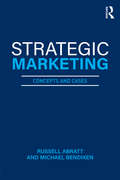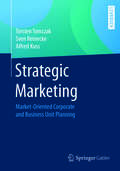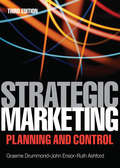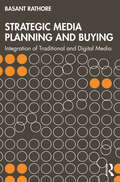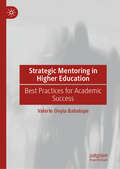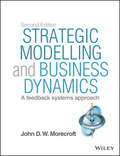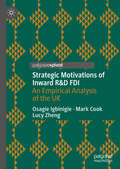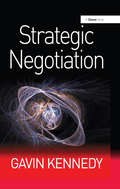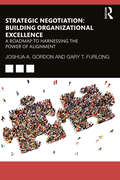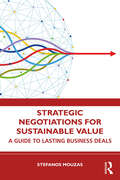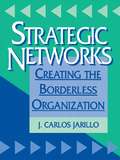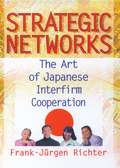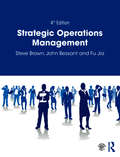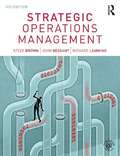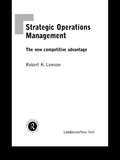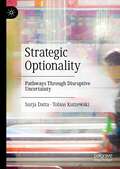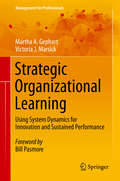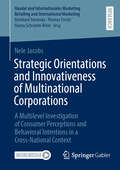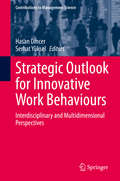- Table View
- List View
Strategic Marketing: Concepts and Cases
by Russell Abratt Michael BendixenThis book is a unique collection of comprehensive cases that explore concepts and issues surrounding strategic marketing. Chapters explain what strategic marketing is, and then discuss strategic segmentation, competitive positioning, and strategies for growth, corporate branding, internal brand management, and corporate reputation management. With case studies from a broad range of global contexts and industries, including Burger King, FedEx, and Twitter, readers will gain a working knowledge of developing and applying market-driven strategy. Through case analysis, students will learn to: examine the role of corporate, business, and marketing strategy in strategic marketing; recognize the implications of markets on competitive space with an emphasis on competitive positioning and growth; interpret the various elements of marketing strategy and apply them to a particular real-world situation; apply sound decision-making strategies and analytical frameworks to specific strategic marketing problems and issues; apply ethical frameworks to strategic marketing situations. Strategic Marketing: Concepts and Cases is ideal for advanced undergraduate and postgraduate students, as well as those studying for an MBA or executive courses in strategic marketing or marketing management.
Strategic Marketing: Market-oriented Corporate And Business Field Planning
by Sven Reinecke Torsten Tomczak Alfred KussDieses Lehrbuch f#65533;hrt in verst#65533;ndlicher, systematischer und knapper Form in die Problemfelder der Marketingplanung ein. Sowohl die Marketingplanung auf der Unternehmens- und Gesch#65533;ftsfeldebene als auch die Planung des Marketing-Mix werden behandelt. Mit Hilfe von zahlreichen kurzen Fallbeispielen werden wesentliche Aspekte des Inhaltes veranschaulicht. Die Autoren haben in der 7. Auflage alle Kapitel #65533;berarbeitet und diverse neue Praxisbeispiele aufgenommen. Bei der Markenf#65533;hrung wurden einige Grundlagen erg#65533;nzt.
Strategic Marketing: Plannning And Control (Cim Coursebook Ser.)
by John Ensor Graeme Drummond Ruth AshfordThe completely revised and updated 3rd edition of the hugely successful Strategic Marketing: planning and control continues to provide a concise yet comprehensive synthesis of the key strategic marketing concepts. The text cuts through the complexity and jargon surrounding the subject and is tightly written to accommodate the reading time pressures on students.A clear, comprehensive and user-friendly text it provides an unrivalled digest of the tools, techniques and knowledge required to understand strategic marketing. Covering contemporary issues by exploring current developments in marketing theory and practice. It offers-• Coverage of key developments in customer relationship management, business ethics, market-led orientation and resource/asset-based approaches to internal analysis and planning• A highly exam focused approach which has been class tested and refined• A new chapter offering a ‘problem-based learning’ (PBL) approach to the subject• Thoroughly revised and updated case studies and vignettes of real world best practice throughout the textNow established as one of the leading texts in the field Strategic Marketing 3rd edition will continue to be an essential learning tool for CIM students and marketing undergraduates and postgraduates. It will also be ideal for marketing professionals who want to improve their strategic knowledge and those on relevant executive courses.
Strategic Media Decisions (2nd Edition): Understanding the Business End of the Advertising Business
by Marian AzzaroLearn how the world of media - the $300 billion business end of the ad business works from some of media's top professors and professionals. This is a book in touch with today - packed with genuine substance and contemporary best practices.
Strategic Media Planning and Buying: Integration of Traditional and Digital Media
by Basant RathoreThis book explores media planning, media buying and the advertising landscape in India. It provides a comprehensive look into the essential aspects of media strategies for brands and businesses to effectively reach their intended audiences and consumers.The book cuts through and demystifies complex media jargon and theories to provide an understanding of the key concepts for developing a media mix that will yield results for businesses. It discusses media research and theories and offers marketers suggestions on how to use both traditional and digital media effectively to build brands. The first section of the book introduces the basics of media theory, including data collection methodologies and their application. The second section covers the fundamentals of planning a media strategy and advertising plans and campaigns based on the goals of the company or brand. The third section discusses the practical nuances of planning – like media mix selections, media vehicle selections and media buying across all types of media.This book will be of interest to students and researchers of business and management studies, media and communication studies as well as to marketing and media professionals working in different sectors of business.
Strategic Mentoring in Higher Education: Best Practices for Academic Success
by Valerie Onyia BabatopeThis book offers a comprehensive guide to strategic mentoring in higher education, presenting best practices to enhance academic success and institutional excellence. It systematically explores mentoring concepts, models, and applications across academic settings, addressing critical themes such as mentor-mentee dynamics, diversity and inclusion, work-life balance, and leadership development. The chapters delve into cross-disciplinary collaboration, technology integration, research mentorship, and strategies for career advancement, supported by case studies and evidence-based approaches. Designed for educators, administrators, and practitioners, this resource provides actionable insights for building effective mentoring programs that foster student retention, faculty growth, and equitable learning environments. With emphasis on program evaluation and sustainable practices, it equips readers to navigate challenges and cultivate mentorship cultures that drive innovation and academic achievement in tertiary institutions worldwide.
Strategic Modelling and Business Dynamics + Website
by John D. MorecroftAccurate modelling of dynamic system for better business strategy The business environment is constantly changing, and firms need the ability to adapt. In a market where a single misstep could result in massive losses, modelling serves as a "dry run" for testing ideas and predicting the behaviour of influencing forces. Strategic Modelling and Business Dynamics is an essential guide to strategic modelling, helping readers understand modelling processes while taking all contributing factors into account. Written by an internationally regarded authority, this comprehensive guide covers all stages of model building, from conceptual to technical, demonstrating a range of in-depth practical examples that vividly illustrate important or puzzling dynamics in firm operations, strategy, public policy, and everyday life. Introduces the system dynamics approach of modelling strategic problems in business and society Includes industry examples and public sector applications Provides the latest state-of-the-art thinking and techniques for systems modelling
Strategic Motivations of Inward R&D FDI: An Empirical Analysis of the UK
by Mark Cook Osagie Igbinigie Lucy ZhengThis book explores the motivations of R&D foreign direct investment (FDI) in a developed country, placing a particular emphasis on the United Kingdom. Multinational enterprises operate in increasingly competitive and complex environments, and the role of R&D can be vital in the creation, adaptation or adoption of knowledge across different foreign locations. This book offers valuable insight into the similarity and distinction between strategic and specific motivations of R&D FDI at the country level, addressing a key gap in previous research on the topic. Based on an empirical study, the authors challenge current thinking in international business studies by shifting focus from R&D FDI globalisation to the concentration of R&D FDI in a single location, conceptualising the interplay of strategic and location-specific motivations. This book is a vital read for students, researchers and practitioners interested in understanding the motivations behind R&D FDI decisions in the UK and beyond.
Strategic Moves: Mechanisms for Market Entry and Dominance--What Innovators Need to Know
by Harvard Business Review PressThere's much more to strategy than deciding which versions or variant of these strategies is best for your company or a particular innovation. This chapter explores a number of potential strategic moves you can make to move your innovation to the marketplace including process innovation, product differentiation, and extending innovation through platforms. This chapter was originally published as chapter 7 of "Harvard Business Essentials: The Innovator's Toolkit."
Strategic Moves: The Mechanisms of Success
by Harvard Business Review PressA military analogy suggests that a business strategy must reckon with the realities of the market and the existence of competing firms, some of which will have greater market power and resources. Competitive strategy then means that one must strike in an area of competitor weakness or where the competitor is unlikely to fight back or will fail to fight back effectively. This chapter offers a number of strategic moves that can be used to enter and build defensible positions in the marketplace.
Strategic Negotiation
by Gavin KennedyA first-rate organizational business plan demands an understanding of the dynamics behind remuneration, joint ventures, partnerships, alliances, major contracts; in fact, all of the commercial imperatives that will define success or failure over a five-year (or longer) period. And realizing this plan will involve complex and often multi-level or multi-party negotiations. The scale and context of these negotiations requires a level of strategic awareness because the interests of the parties are more complex, the options more numerous, and the outcomes more critical than at a tactical level. Strategic Negotiation is written for senior executives who provide input to or assessment of their organization's medium or long-term planning process, and who are engaged in implementing any aspects of their organization's plans. Part One focuses on the foundations of strategic negotiation: the commercial imperatives - what the organization must do to restructure and resource its operations to achieve commercial success - and the negotiation strategies associated with each. It also explains the logistics of managing complex public and private sector negotiations. Part Two includes the tools for successful negotiation: bid strategies; techniques for analyzing your position before you start and reassessing it during the negotiation; and the negotiation agenda and how to design and compile it. If you are operating at a senior level where negotiations are, by their nature, high value, complex, multi-level and often multi-party, what better guide than Gavin Kennedy, a long-standing world expert on negotiation, and his book Strategic Negotiation?
Strategic Negotiation: A Roadmap to Harnessing The Power of Alignment
by Gary Furlong Joshua GordonEmpowering organizations to thrive, this book provides a clear diagnostic framework with specific approaches and processes that leaders can use to build a negotiation function that will succeed each and every time.Negotiation is a required skill and a core competency, but most organizations focus exclusively on individual negotiation skills and abilities and pay little attention to the internal culture and environment that shapes and guides these individuals. This book takes a dramatically different approach to building success in each and every negotiation, producing results that align with organizational strategy at all levels.Professionals in sales, procurement and supply chain, human resources, change management, mergers and acquisitions, contracts, start-ups, construction partnering, and training consultants and students of business and law will value a text that understands how to build negotiation skills and capability across the organization by aligning individual skills with an evidence-based approach that actually works.
Strategic Negotiation: A Roadmap to Harnessing The Power of Alignment
by Gary T. Furlong Joshua A. GordonEmpowering organizations to thrive, this book provides a clear diagnostic framework with specific approaches and processes that leaders can use to build a negotiation function that will succeed each and every time.Negotiation is a required skill and a core competency, but most organizations focus exclusively on individual negotiation skills and abilities and pay little attention to the internal culture and environment that shapes and guides these individuals. This book takes a dramatically different approach to building success in each and every negotiation, producing results that align with organizational strategy at all levels. Professionals in sales, procurement and supply chain, human resources, change management, mergers and acquisitions, contracts, start-ups, construction partnering, and training consultants and students of business and law will value a text that understands how to build negotiation skills and capability across the organization by aligning individual skills with an evidence-based approach that actually works.
Strategic Negotiations for Sustainable Value: A Guide to Lasting Business Deals
by Stefanos MouzasStrategic Negotiations for Sustainable Value is a guide to learning how to conclude lasting business deals that are environmentally, socially and economically sustainable in an international business context. Managers today need to negotiate with multiple stakeholders, such as suppliers, customers, agencies, governments and authorities, to be able to access the resources that they need. Creating and capturing sustainable value is not a fixed entity but rather the outcome of long and time-consuming negotiations that affect further negotiations. Providing illustrative international case studies throughout each chapter, this book explores: the strategic challenges that managers face in their markets today; the practical, analytical tools that needed to create and capture value that is sustainable; the behavioral biases and cognitive errors in strategic negotiations; the various ways by which negotiators manifest their business agreements in contracts; the managerial implications of strategic negotiations. The book is ideal for advanced undergraduate and postgraduate students in negotiation, business administration, management, or related courses such as business marketing, and customer or key account management. It is equally valuable to industry professionals, managers involved in negotiating with customers, suppliers or partners and those pursuing professional qualifications or accreditation in marketing, sales or management.
Strategic Networks: Creating The Borderless Organization
by J Carlos JarilloStrategic Networks examines the new style of industrial co-ordination which enables independent companies to work so closely together that they can sometimes present a 'single face' to the outside world. Co-ordination is not achieved by mergers and acquisitions, but through the creation of a 'strategic network' of companies working towards the same goals. Based on the author's extensive research, the book first analyses the economic arguments forindustry co-ordination, and suggests in which industries it is most likely to occur. The second part of the book focuses on * managerial implications for this type of organization * impact on responsibilties * control without ownership * co-operationinstead of competition * how to set up alliances and how to maintain them A wide range of international examples and cases are featured in the book. J. Carlos Jarillo is Professor of Strategy at the University of Geneva (previously Professor of GeneralManagement and International Strategy at IMD, Switzerland). His research on strategy has been widely published in more than two dozen articles and books. He also acts as senior adviser to a large number of international corporations.
Strategic Networks: The Art of Japanese Interfirm Cooperation
by Erdener KaynakWith Strategic Networks: The Art of Japanese Interfirm Cooperation, you will examine the structure and dynamics of Japanese business networks and discover successful Japanese business practices and opportunities. For professors of business and Japanese studies, as well as managers of firms throughout the world, this book analyzes new and innovative networks through case examples from the Japanese automobile, chemical, and electronics industries. Strategic Networks offers you insight into the management of these company partnerships and how they work to increase the competitiveness of businesses and allow firms within the network to share important knowledge.Unknown to many, several of the management concepts that made Japanese companies successful in the 1980s, such as total quality control (TQC) and continuing improvement processes (CIP), were only a part of the formula for a successful business. This book discusses types of Japanese strategic networks, another element of Japan’s thriving business structure of today, how they are influenced by Japanese cultural values and state interventions, and why all of the businesses involved are benefiting from these networks.Evaluating the theoretical foundation of these business relationships and intercompany cooperation, Strategic Networks offers you up-to-date information on the structures of Japanese firms by: examining Karl Popper’s ideas on critical rationalism and how Japanese companies follow his theories of problem solving, questioning, and developing knowledge explaining the system, growth, and game theories in order to completely understand a network and all of its facets exploring the ability to work with and navigate strategic networks when they are managed without strict plans or with unforeseen circumstances recognizing how networks enable the activation of interpreneurs to develop future visions, innovations, and responsible leadership for the networkComplete with illustrations to emphasize important points along with insight into networks in the twenty-first century, Strategic Networks offers information and research that will help you understand how Japanese networks operate and how Japanese firms are conducting business differently. As a result, you will learn how the changing values in Japanese society influence company structures and procedures and come to understand the unique workings and effective structures of strategic networks.
Strategic Operations Management
by Steve Brown John Bessant Fu JiaStrategic Operations Management, 4th Edition, shows how vital it is to have world-class operations management in any organisation. In the past, where organisations tended to be more hierarchical than today, the words, "strategy" and "operations" were almost mutually exclusive. In today's highly competitive environment, though, strategic operations capabilities must be in place for organisations to provide goods and services that meet and exceed customer requirements. Key issues such as cost, speed, quality, flexibility and constant innovation are all part of strategic operations. However, achieving such capabilities does not come by chance - instead a range of factors need to be put in place. This new edition pays equal attention to manufacturing and service sectors. It includes numerous references to, and discusses, major changes taking place in the business world, including 3-D printing; virtual organisations; Cloud – Big Data and the Internet of Things; Servitization, global markets, ongoing innovation and managing within complex supply networks. Cases are included from a range of settings across the globe. Students taking MBA, MSc and MBM classes on operations management, advanced operations management, and strategic operations management will find this textbook fulfills all their requirements whilst advanced undergraduate classes in these areas will also find the book an essential read.
Strategic Operations Management
by Steve Brown John BessantThis revitalized new edition of Strategic Operations Management focuses on the four core themes of operations strategy, a vital topic for any company's objectives: strategy, innovation, services, and supply. Expertly authored by a team of Europe's top scholars in the field, the text is enhanced by the addition of new case examples, graphic images, learning objectives, discussion questions, and suggestions for further reading. In addition, the companion website offers a comprehensive set of web links and videos to augment the learning experience. This truly comprehensive volume underscores the differences between the core theories that underpin operations management. Students taking MBA, MSc and MBM classes on operations management, advanced operations management, and strategic operations management will find this textbook fulfills all their requirements whilst advanced undergraduate classes in these areas will also find the book an essential read.
Strategic Operations Management: The New Competitive Advantage
by Robert H. LowsonThis indispensable text offers students a high quality treatment of strategic operations management. It provides the reader with a clear understanding of the importance and nature of operations strategy by determining exactly which management activities, core competencies, resources and technologies underpin an operational strategy. The book demonstrates how various operational elements and components can be combined and customised into unique operational strategies. When these strategies are correctly implemented, they provide sustainable competitive advantage and allow firms to provide a diverse range of services and goods in their increasingly demanding, complex and dynamic marketplaces and spaces.Includes chapters covering customising operational strategies for retail, manufacturing, services and SMEs, and sections on eBusiness and complexity theory in relation to operations theory.Features include:*extended case-studies including several from Europe and the USA*case vignettes*learning objectives*key terms*chapter introduction and 'maps' to aid reader accessibility*'time out' boxes to prompt the reader to reflect on what has been learnt*'critical reflection' boxes that analyse theories and models.
Strategic Optionality: Pathways Through Disruptive Uncertainty
by Surja Datta Tobias KutzewskiThis book offers a fresh approach to strategy by examining the idea of Optionality. Optionality is the right, but not the obligation, to take an action. Built on historic military tactics, static engineering principles, and equilibrium-seeking economics, conventional strategic-thinking suffers some weaknesses, principal of which is its inability to deal with conditions of high uncertainty. This book begins by dividing the business landscape into three distinct domains; (1) Fragile, (2) Robust, and (3) Long-shot (FRL), which alert us to the context-specificity of strategy tools, before suggesting that theoretical lenses are required to understand and implement strategy in VUCA (Volatile, Uncertain, Complex, and Ambiguous) domains. The authors explore the concept and methodology of Optionality in order to demonstrate how it can be used in conjunction with existing strategy tools in order to achieve competitive success. It will be of great interest to academics and students of strategy and innovation.
Strategic Organizational Learning
by Martha A. Gephart Victoria J. MarsickThis book discusses the successes and challenges of leveraging organizational learning in effective strategy development and execution. The authors introduce a framework that helps organizations develop core capabilities to enable them to shift direction rapidly and proactively shape future environments. They also offer a wide selection of cases to illustrate this framework. While some cases highlight fundamental strategic change over time, others are snapshots of mechanisms gradually put in place to jointly optimize learning and performance. There is no one best or right way to leverage strategic organizational learning; different practices may lead to the same outcome and similar practices may lead to different outcomes. The system dynamics underlying such learning -- not the simple adoption of one or other practice -- are key to success in institutionalizing a performance-based learning approach.
Strategic Orientations and Innovativeness of Multinational Corporations: A Multilevel Investigation of Consumer Perceptions and Behavioral Intentions in a Cross-National Context (Handel und Internationales Marketing Retailing and International Marketing)
by Nele JacobsMultinational corporations (MNCs) face significant challenges in a dynamic global business environment. In times of economic hardship and increased competition, innovativeness and the demonstration of key abilities are essential to the success and resilience of MNCs. In her research, Nele Jacobs adopts a theory-based approach to examine the interplay between a firm&’s perceived strategic orientations, innovativeness, special corporate abilities, and consumer responses in an international context. Furthermore, Jacobs provides valuable insights into the differences in consumer cognition and behavior caused by critical country-level boundary conditions.
Strategic Outlook for Innovative Work Behaviours: Interdisciplinary and Multidimensional Perspectives (Contributions to Management Science)
by Hasan Dincer Serhat YükselThis book presents various perspectives on innovative work behaviour, focusing on problem recognition, idea generation, idea promotion and the realisation of these ideas. It first highlights important corporate issues, such as uncertainty, performance management, technological infrastructure, and strategy development, and subsequently presents studies that offer solutions. Further, the book evaluates the significance of research and development, effective communication and corporate governance. Lastly, it discusses the implications of idea realisation, examining resource dependence theory, organizational trust and eco-innovations.
Strategic Outsourcing at Bharti Airtel Ltd.
by V. G. Narayanan F. Asis Martinez-Jerez Michele JurgensFaced with exponential growth and a competitive telecom environment, Bharti looks for ways to better manage its capital expenditures for telecommunications and information technology. One option is to hand over management of its telecom and IT networks to its vendors. Explores the pros and cons of such an outsourcing arrangement for a company in an industry where technological superiority is considered an essential element in competitive strategy.
Strategic Outsourcing at Bharti Airtel Ltd. One Year Later
by V. G. Narayanan F. Asis Martinez-Jerez Michele JurgensAn abstract is not available for this product.
